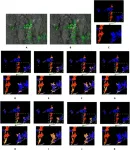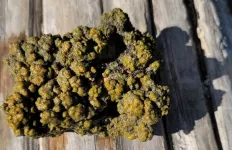(Press-News.org) LA JOLLA, CALIF. April 25, 2023 - With the help of a new grant from the U.S. Department of Defense for more than $1.7 million, Associate Professor Charles Spruck, Ph.D., will advance an innovative therapeutic approach for metastatic prostate cancer. Known as viral mimicry, the approach tricks the body into thinking that it has a viral infection, stimulating an immune response that can help the body fight cancer.
“In viral mimicry, the body thinks there’s an infection, which kicks the immune system into high gear,” says Spruck. “With the immune system activated, cancer cells are more responsive to treatment, and tumor growth slows. All of this can happen without triggering treatment resistance, which could be a huge benefit for treating prostate cancer.”
Prostate cancer is the second most diagnosed cancer in men worldwide and the fifth leading cause of cancer death among men. According to the World Health Organization, there were an estimated 1.4 million new cases of prostate cancer and more than 375,000 deaths from the disease in 2020 alone.
“Many cases of prostate cancer are treatable, so people don’t think of it as a major public health issue,” says Spruck. “But when prostate cancer becomes metastatic or resistant to therapy—such as hormone therapy—it can ultimately become a fatal disease. One of the benefits of this approach is that it works in a completely different way, so it’s not as susceptible to resistance.”
The new approach takes advantage of a bizarre evolutionary feature of our genomes called endogenous retroviruses (ERVs). These are small sequences in our genomes, left behind by viruses that infected our ancient ancestors. ERVs have been found in the genomes of early humans such as Neanderthals, but are thought to have first emerged in animals hundreds of millions of years ago, well before there were any humans. Unlike regular viruses, ERVs do not make us sick. Instead, they bounce around our genomes and help control gene expression.
“ERVs are inactive, so they don’t produce proteins the way regular genes do,” says Spruck. “In this study, we discovered that we can reactivate these viruses selectively in cancer cells and essentially fool the body into thinking it needs to trigger an immune response against the tumor.”
Spruck’s team has already discovered a potential drug that can induce viral mimicry in prostate cancer cells. However, the drug is not potent or selective enough to enter the clinic. One of the goals of their project is to develop more potent compounds that can induce viral mimicry, which could lay the foundation for tomorrow’s prostate cancer treatments.
“Something very exciting about this work is that it has the potential to move to the clinic extremely quickly,” says Spruck. “We hope to have a drug ready for the clinic within three years.”
In addition to prostate cancer, the viral mimicry approach could be effective across a range of treatment-resistant cancers. The researchers are already exploring the approach in ER+ breast cancer in which up to 50% of patients experience a relapse due to treatment resistance.
“We initially discovered viral mimicry in breast cancer, and we suspected it could work in other cancers,” says Spruck. “This project is helping us see how far we can take this unique approach, and I’m confident we’ll be able to apply it more broadly in the future as we continue to learn more about how it works.”
The grant is titled “A Viral Mimicry Approach to Target Prostate Cancer (HT9425-23-1-0135).”
END
Charles Spruck awarded $1.7M to advance “ancient virus” treatment for prostate cancer
The approach uses ancient viruses, embedded in our genomes, to trick the body into thinking it has an infection.
2023-04-25
ELSE PRESS RELEASES FROM THIS DATE:
New motion blur restoration approach for improved weed detection in crop fields
2023-04-25
Effective weed control is crucial in agriculture to ensure high crop productivity. It entails the careful separation of weeds from crops before herbicides are sprayed in the fields. In simple terms, the goal of weed control is to remove the weeds while ensuring that the crop are not harmed. Traditional weed control methods have several drawbacks, such as crop contamination, herbicide waste, and poor accuracy. Therefore, it is essential to develop methods that can precisely locate and identify the boundary between a crop and weed and implement ...
Argonne’s self-driving lab accelerates the discovery process for materials with multiple applications
2023-04-25
Researchers have a new scientific tool called Polybot, combining the power of artificial intelligence with robotics. Potential applications include speeding up the discovery of wearable biomedical devices, materials for better batteries and more.
Today’s wearable technologies like smart glasses and watches are just the start. The next generation of flexible electronics will be more efficient and sustainable, better able to monitor our health and treat certain diseases, and much more. They will be composed of electronic polymer materials — a soft pliable substance that can conduct electricity.
“Just imagine the next generation of polymer ...
Champion for improved perioperative care for older adults: Shelley R. McDonald, DO, PhD, MCG honored as AGS Clinician of the Year
2023-04-25
New York (April 25, 2022) — The American Geriatrics Society (AGS) today announced Shelley R. McDonald, DO, PhD, MCG, as 2023 Clinician of the Year. Dr. McDonald, who is an Associate Professor of Internal Medicine at Duke University School of Medicine, will be honored at the 2023 AGS Annual Scientific Meeting (#AGS23) being held in Long Beach, CA, from May 4-6 (preconference day is May 3).
“Our 2023 Clinician of the year, Dr. Shelley McDonald, is a national champion for improved perioperative care of older adults undergoing surgery,” said ...
RCT-DUPLICATE findings demonstrate capability of real-world evidence studies to reach conclusions similar to randomized clinical trials
2023-04-25
NEW YORK, April 25, 2023 ‒ Aetion®, the global leader in real-world evidence (RWE) technology and analytics, is pleased to announce the culmination of the RCT-DUPLICATE demonstration project, with complete findings published today in The Journal of the American Medical Association (JAMA). This three-year initiative tested whether researchers asking clinical questions in real-world data (RWD) — data from patients’ day-to-day interactions with the healthcare system — would obtain similar results to findings from randomized clinical trials (RCTs). In cases where clinical trial designs aligned with real patient care processes, the RWE studies and RCTs came ...
Exposure to cannabinoids in pregnancy increases newborn mortality and respiratory problems
2023-04-25
Consumption of cannabis (marijuana) or derivatives during pregnancy can cause respiratory problems for the baby, such as impaired control of breathing and diminished sensitivity to carbon dioxide, both of which favor sudden infant death syndrome. These are the main findings of a study conducted in Brazil and reported in an article published in the British Journal of Pharmacology.
The authors are researchers at São Paulo State University (UNESP) and the University of São Paulo (USP). They gave pregnant rats a synthetic compound (WIN 55) that acts on the brain in a similar manner to natural cannabinoids. Harmful effects occurred mainly in male pups.
“Cannabis ...
Matching form and function of brain cell types
2023-04-25
Investigators at Cedars-Sinai have created computer-generated models to bridge the gap between “test tube” data about neurons and the function of those cells in the living brain. Their study, published in the peer-reviewed journal Nature Communications, could help in the development of treatments for neurological diseases and disorders that target specific neuron types based on their roles.
“This work allows us to start looking at the brain like the complex machine that it is, rather than ...
Small steps can yield big energy savings and cut emissions from MRIs
2023-04-25
Medical centers around the world could significantly reduce their carbon footprint and expenses by turning off MRIs and putting them in the lowest power mode instead of idling them when not in use, a new study in Radiology found.
Health care is responsible for up to 4.4% of global carbon emissions, and imaging contributes an outsized share due to its energy-intensive devices, especially MRI. A 2020 study found that three CTs and four MRIs used the same amount of energy per year as a town of 852 people, for example.
Though turning a machine off is better than idling, a substantial amount of MRI energy consumption occurs in “off” ...
Study links nutrients, brain structure, cognition in healthy aging
2023-04-25
CHAMPAIGN, Ill. — In a new study, scientists explored the links between three measures known to independently predict healthy aging: nutrient intake, brain structure and cognitive function. Their analysis adds to the evidence that these factors jointly contribute to brain health in older adults.
Reported in the Journal of Nutrition, the study found that blood markers of two saturated fatty acids, along with certain omega-6, -7 and -9 fatty acids, correlated with better scores on tests of memory and with larger brain structures in the frontal, ...
UNC Charlotte faculty member receives NASA Exobiology grant
2023-04-25
For the first time in the University of North Carolina at Charlotte’s nearly 80-year history, a faculty member has won a NASA Exobiology grant. Assistant Professor of Bioinformatics and Genomics Richard Allen White III will use the ultra-competitive grant in his research on microbialites, a kind of “living rock” that could hold the key to how life formed on Earth.
Microbialites form when microbial mats, living colonies of mostly bacteria, transform into stronger hard structures. White explores how viruses may have helped to kickstart the transformation (i.e., lithification) of modern microbialites, which ...
Study: Treatment for opioid addiction lags despite policies designed to increase it
2023-04-25
Treating opioid addiction should be much easier now than it was a few years ago, thanks to pandemic-era rule changes that aim to improve access to buprenorphine, a medicine proven to help in recovery.
But a new study shows the rate of people starting on buprenorphine remained flat from 2019 through 2022, while the percentage of patients who stayed on buprenorphine for at least six months hovered at just over 20% from 2016 through 2022.
Until more health care providers start offering buprenorphine treatment -- and to take advantage of opportunities like emergency visits and hospitalizations ...
LAST 30 PRESS RELEASES:
Sleep loss linked to higher atrial fibrillation risk in working-age adults
Visible light-driven deracemization of α-aryl ketones synergistically catalyzed by thiophenols and chiral phosphoric acid
Most AI bots lack basic safety disclosures, study finds
How competitive gaming on discord fosters social connections
CU Anschutz School of Medicine receives best ranking in NIH funding in 20 years
Mayo Clinic opens patient information office in Cayman Islands
Phonon lasers unlock ultrabroadband acoustic frequency combs
Babies with an increased likelihood of autism may struggle to settle into deep, restorative sleep, according to a new study from the University of East Anglia.
National Reactor Innovation Center opens Molten Salt Thermophysical Examination Capability at INL
International Progressive MS Alliance awards €6.9 million to three studies researching therapies to address common symptoms of progressive MS
Can your soil’s color predict its health?
Biochar nanomaterials could transform medicine, energy, and climate solutions
Turning waste into power: scientists convert discarded phone batteries and industrial lignin into high-performance sodium battery materials
PhD student maps mysterious upper atmosphere of Uranus for the first time
Idaho National Laboratory to accelerate nuclear energy deployment with NVIDIA AI through the Genesis Mission
Blood test could help guide treatment decisions in germ cell tumors
New ‘scimitar-crested’ Spinosaurus species discovered in the central Sahara
“Cyborg” pancreatic organoids can monitor the maturation of islet cells
Technique to extract concepts from AI models can help steer and monitor model outputs
Study clarifies the cancer genome in domestic cats
Crested Spinosaurus fossil was aquatic, but lived 1,000 kilometers from the Tethys Sea
MULTI-evolve: Rapid evolution of complex multi-mutant proteins
A new method to steer AI output uncovers vulnerabilities and potential improvements
Why some objects in space look like snowmen
Flickering glacial climate may have shaped early human evolution
First AHA/ACC acute pulmonary embolism guideline: prompt diagnosis and treatment are key
Could “cyborg” transplants replace pancreatic tissue damaged by diabetes?
Hearing a molecule’s solo performance
Justice after trauma? Race, red tape keep sexual assault victims from compensation
Columbia researchers awarded ARPA-H funding to speed diagnosis of lymphatic disorders
[Press-News.org] Charles Spruck awarded $1.7M to advance “ancient virus” treatment for prostate cancerThe approach uses ancient viruses, embedded in our genomes, to trick the body into thinking it has an infection.






